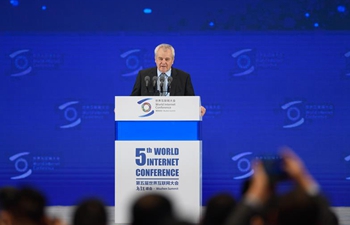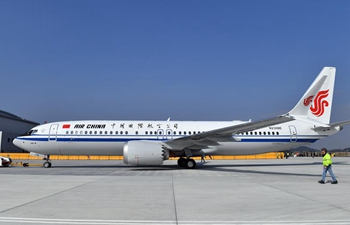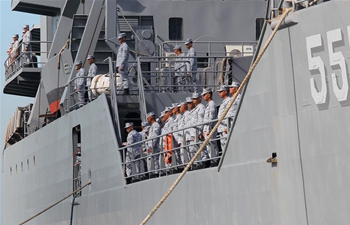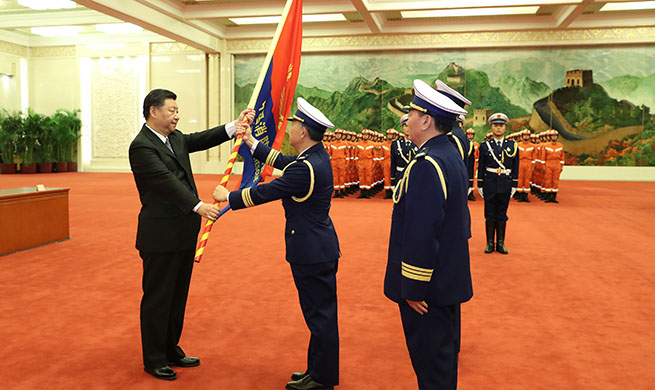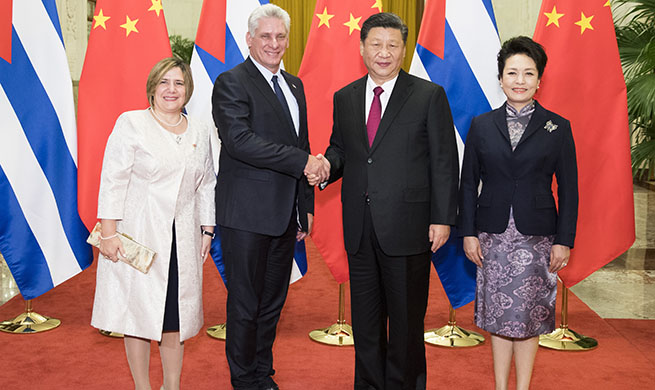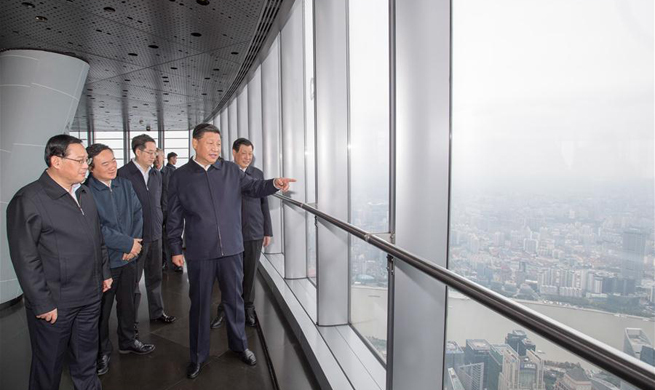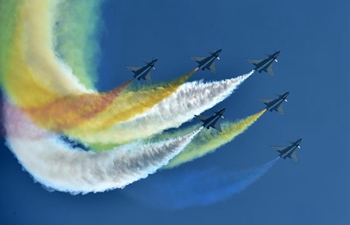ISTANBUL, Nov. 9 (Xinhua) -- The unexpected U.S. offer for a bounty on three top figures of the Kurdistan Workers' Party (PKK) is seen as a move to make Turkey not treat the U.S.-backed Kurdish militia in Syria as a terror group like the PKK.
Washington ultimately seeks to get Ankara to accept the Kurdish militia in Syria, known as the People's Protection Units (YPG), as a legitimate entity, Cahit Armagan Dilek, head of the Ankara-based 21st Century Turkey Institute, told Xinhua.
"MEANLINGLESS GIMMICK"
The U.S. State Department announced on Tuesday rewards for information on three top members of the PKK, outlawed by Ankara over its continued armed struggle against the Turkish state.
Those who inform on the whereabouts of Murat Karayilan, the acting PKK leader, as well as Cemil Bayik and Duran Kalkan, may be awarded up to 5 million U.S. dollars, 4 million dollars and 3 million dollars respectively, according to the U.S. statement.
The PKK seeks to establish an autonomous, if not an independent, Kurdistan in Turkey's predominantly Kurdish southeast.
"The U.S. move essentially aims to forge a distinction between the PKK and the YPG," said Dilek, a former staff officer in the Turkish military.
Turkey sees the YPG as the Syrian offshoot of the PKK. Both groups see Abdullah Ocalan, who has been in jail in Turkey since 1999, as their leader.
Ankara has long criticized Washington for its military support to the YPG, which the United States has used as a ground force against Islamic State militants in Syria.
"This American move is a meaningless gimmick, designed to placate Ankara," Faruk Logoglu, a former senior diplomat, told Xinhua.
"If the Americans had been serious about catching these terrorists long sought by Turkey, they could have done so years ago," he added.
The PKK, based in northern Iraq, has long been recognized as a terrorist organization by the United States, yet Ankara has from time to time accused Washington of aiding the group.
The U.S. move against top PKK figures came shortly after Turkish military hit some YPG targets along the Turkish border with artillery fire. Ankara has vowed time and again that it would not tolerate any YPG control near its border.
Thanks to U.S. military support, the YPG has established two self-declared autonomous cantons in the eastern part of the Euphrates River along the Turkish border by taking advantage of the war in Syria. It also controls, under the patronage of U.S. troops, the Manbij region which lies immediately to the west of the Euphrates and some 40 km from the Turkish border.
Ankara is concerned that the YPG, estimated to have 60,000-70,000 fighters, will serve as the army of a Kurdish state the United States is seeking to carve out in Syria.
PENDING ISSUES IN TIES
Dilek, who feels the U.S. move lacks sincerity, maintained that the U.S. intelligence should be in the know about the exact whereabouts of the leading PKK figures.
For him, the rewards for top PKK members indicate that the United States is planning to hand over several or all three PKK leaders to Turkey at a moment it judges opportune.
Turkey has treated the U.S. move with cautious optimism, underlining that it is a positive but long overdue step.
It's unacceptable for Ankara that Washington puts a bounty on PKK leaders while continuing to send truckloads of weapons to the YPG, said Turkish Defense Minister Hulusi Akar.
Turkey's presidential spokesman Ibrahim Kalin made clear that Ankara would not change its attitude toward the YPG, saying Turkey expects the United States to end its ties with the militia and its political wing, the Syrian Democratic Union Party.
Despite sharp Turkish criticism, the United States, Turkey's NATO ally, has reportedly continued to supply weapons to the YPG, including some sophisticated ones.
According to Ankara, Washington has provided the YPG with more than 19,000 truckloads of weapons so far and has set up 22 military bases in the YPG-held territory.
It is widely argued that the United States may also hope for a normalization of ties with Turkey by moving against PKK figures, which were quite strained until recently.
But the analysts remain skeptical.
"The U.S. wants to create the perception that Turkish-American relations since the release of Pastor Brunson is on an extending positive trajectory," said Logoglu. "The reality, however, is different."
Andrew Brunson, an American evangelical pastor who had been in prison in Turkey, was released by a Turkish court last month. Following his release, Turkey and the United States have reciprocally removed some sanctions they imposed against each other.
Then, the United States added Turkey to a list of countries, to which it granted temporary exemption from sanctions it re-imposed on Iran.
"The waiver on Iranian sanctions is only temporary," noted Logoglu. "The priorities in Syria continue to be different, and there are pending bilateral and regional issues."
Any perception of amelioration in bilateral ties is faulty, said Dilek, cautioning that the United States may seek to obtain concessions from Turkey in return for handing over some top PKK figures.
"With or without waivers, Turkey will still have to make a choice between Iran and the U.S. when things get hotter," said Logoglu.




